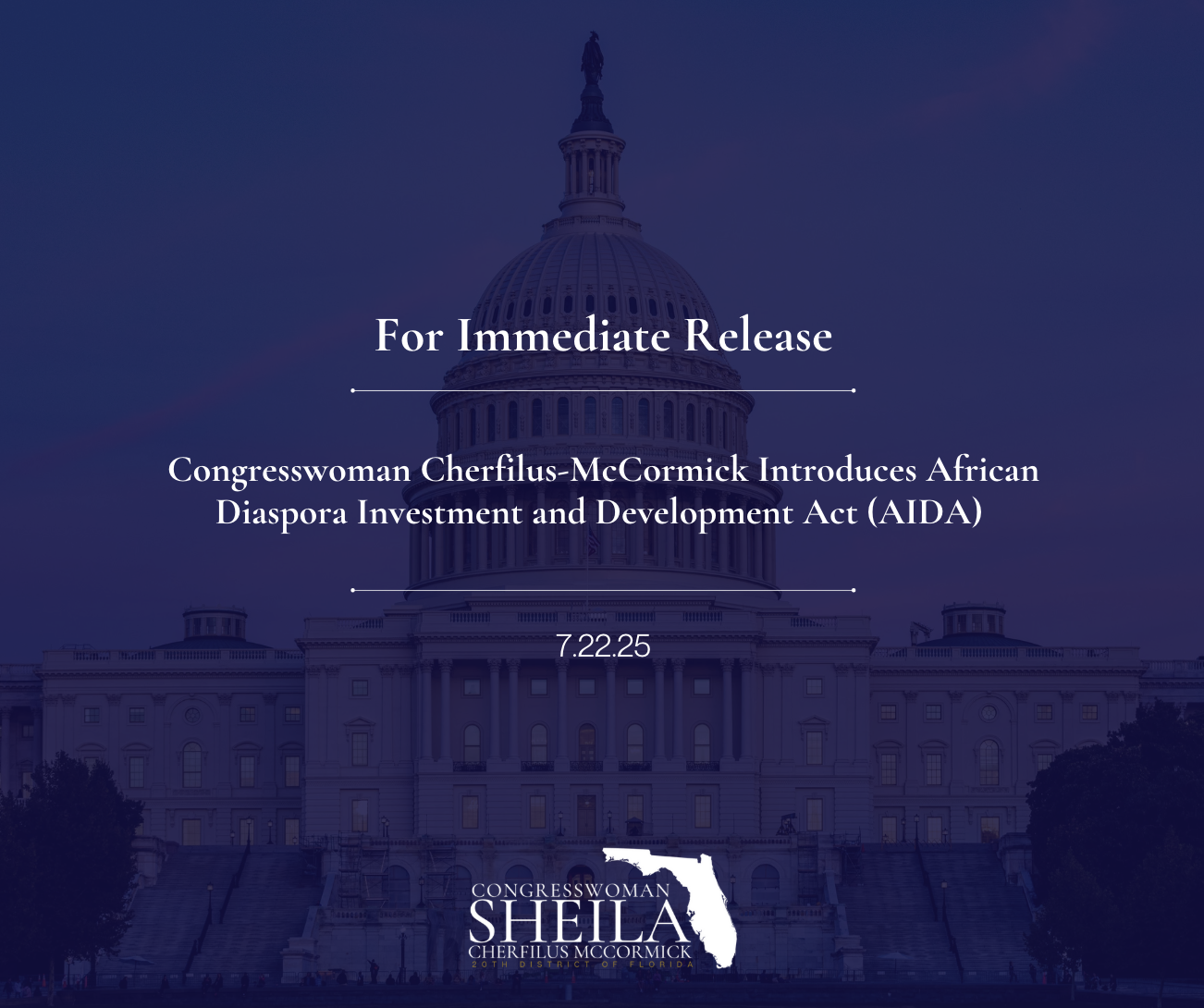WASHINGTON, D.C. – Today, Rep. Sheila Cherfilus-McCormick (D-FL) and Rep. Jonathan J.

cherfilus-mccormick.house.gov
07/22/25
Unlocking the development potential of diaspora communities and helping reduce reliance on foreign aid
WASHINGTON, D.C. – Today,
Rep. Sheila Cherfilus-McCormick (D-FL) and Rep. Jonathan J. Jackson (D-IL) introduced the African Diaspora Investment and Development Act (AIDA), groundbreaking legislation that harnesses the economic power of African and Caribbean diaspora communities to advance sustainable development, reduce remittance costs, and align U.S. foreign policy with grassroots investment.
Millions of Americans with heritage in Africa and the Caribbean send billions of dollars annually to support loved ones and communities in their countries of origin. Yet, they often face high transaction fees, limited investment tools, and few incentives to grow their impact. AIDA addresses these barriers head-on.
As highlighted in
Realizing Africa’s Potential: A Journey to Prosperity by Professor Landry Signé, published by the Brookings Institution, the diaspora can be a powerful driver of development in their home countries—not just through remittances, but by fostering trade, investment, research, innovation, and the transfer of knowledge and technology. This dynamic strengthens U.S. interests by empowering African and Caribbean diaspora communities, who are an integral part of the American fabric, to spur economic growth and innovation both abroad and at home, reinforcing U.S. global partnerships and domestic prosperity.
The African Diaspora Investment and Development Act:
- Reduces the cost of remittances by promoting transparency, competition, and innovation in money transfers.
- Creates tax incentives for diaspora investments that drive sustainable economic development in African and Caribbean countries.
- Encourages financial inclusion through fintech and diaspora-owned money transfer platforms.
- Supports diaspora-led investments with U.S. financial backing.
- Advances U.S. development goals by strengthening diaspora engagement in entrepreneurship, infrastructure, and community development projects abroad.
“The African and Caribbean diasporas are economic engines that deserve recognition and support,”
said Rep. Sheila Cherfilus-McCormick (D-FL). “This bill creates smart incentives that empower families, foster sustainable development, and reflect our values in U.S. foreign policy. AIDA is about unlocking diaspora investment potential. By empowering these communities, we can reduce reliance on foreign aid and embrace a model based on investment, dignity, and shared prosperity.”
“This bill is timely and vital, especially at a time when US policy towards Africa and the Diaspora is shifting from aid to trade,”
said Rep. Jonathan L. Jackson (D-IL). “Remittances ($90 billion inflow to Africa in 2023) have surpassed both foreign assistance and direct investment in many countries in Africa and the Caribbean; a source for development and economic growth. AIDA strengthens the Diaspora contributions in GPD growth through investments and family support – food, housing, education, health care, etc.”
“Reducing remittance costs and eliminating taxes on remittances are critical measures that ensure every dollar sent goes further, directly benefiting health, education, small businesses, and local infrastructure,”
said President of the Nigerian Physicians Advocacy Group, Susan Edionwe. “These changes will empower organizations like ours, whose work relies heavily on diaspora contributions, to expand our impact and better serve the people of Nigeria and beyond.”
"The proposed AIDA bill is a fundamental recognition that as a nation of immigrants the USA holds the ultimate power of transformation in the contributions of its diaspora to the rest of the world,”
said Founder and CEO of Hamstrings, Inc., Eric V. Guichard. “AIDA is about leveraging these diaspora resources for good. It is a paradigm shift in development finance whose time has come."
“Remittances from family and friends in the U.S. to these regions primarily address basic necessities for recipients including housing, food, education, services, small business support and humanitarian assistance,”
said Haiti Renewal Alliance. “A framework for partnerships with the U.S. DFC and diasporas via the AIDA Act to channel remittances for coordinated and robust investments with people on the ground in African and Caribbean countries, ushers the U.S. leading the next generation of successful global development for inclusive growth, peace, stability and opportunity, appreciating diaspora from Africa and Caribbean as key contributors.”
During a time when development assistance from the United States in Africa and in the Caribbean, is being drastically curtailed or even eliminated, African and Caribbean countries will need to increasingly rely on remittances coming from the Diaspora to meet basic needs and to get by,”
said President of Constituency for Africa (CFA), Melvin Foote. “The proposed AIDA legislation if passed, would certainly be a huge step in the right direction.”



